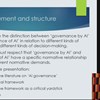guided

Anandi Hattiangadi: A Skeptic's Guide to Virtual Worlds - A response to David Chalmers
Are virtual worlds "real"? Or are they merely "virtual"? In a recent book by David Chalmers, "Reality + - Virtual Worlds and the Problems of Philosophy", he argues that if we in fact were already livi
From grasshoppers to human group behavior – interview with David Sumpter
On January 12th, Dagens Nyheter published an interview with David Sumpter, professor of applied mathematics. David , who is currently working at both Uppsala University and the Institute for Futures St
Ethnicity in England: What Parents' Country of Birth Can and Can't Tell Us about Their Children's Ethnic Identification.
Journal of Ethnic and Migration Studies, 41(3), 399-424. DOI:10.1080/1369183X.2014.920690 Abstract Despite the importance of adequately measuring ethnicity to keep track of ethnic disparities in importa
“There is total silence here”. Ethical competence and inter-organizational learning in healthcare governance
Journal of Health Organisation and Management. DOI:10.1108/JHOM-05-2019-0130 AbstractThe purpose of this paper is to analyse ethical competence related to healthcare governance and management tasks at t

Fredrik Jansson
Senior Lecturer, Mathematics/Applied Mathematics I am a senior lecturer in mathematics/applied mathematics at Mälardalen University and a research affiliate at the Centre for Cultural Evolution at Stockho.
Roadmap for AI Policy Research
AI Policy Lab @Umeå University and MILA - Quebec Artificial Intelligence Institute Abstract This roadmap, developed through collaborative discussions at the recent AI Policy Research Summit, reflects a

Writing and stylistics
Writing and stylistics, "Text och stil", is an initiative offered to researchers in Sweden, which offers workshops and classes in more creative academic writing.
Using Models to Predict Cultural Evolution From Emotional Selection Mechanisms
Emotion Review Abstract Cultural variants may spread by being more appealing, more memorable, or less offensive than other cultural variants. Empirical studies suggest that such “emotional selection” is
Eva Erman: Artificial Intelligence and the Political Legitimacy of Global Governance
Research seminar with Eva Erman. AbstractThe study of the social and ethical impact of AI is still in its infancy and contributions to the field have to keep up with the continuous developments of the important procedural aspects of good AI governance. One of the most important properties of good governance is political legitimacy. Starting out from the assumption that AI governance should be seen as global in scope, this paper has a twofold aim: a) to develop a theoretical framework for theorizing the political legitimacy of global AI governance and b) to demonstrate how it can be used as a critical yardstick for assessing the (lack of) legitimacy of actual instances of AI governance.

Eva Erman: Artificial Intelligence and the Political Legitimacy of Global Governance
The study of the social and ethical impact of AI is still in its infancy and contributions to the field have to keep up with the continuous developments of the booming AI industry. Though it is widely








